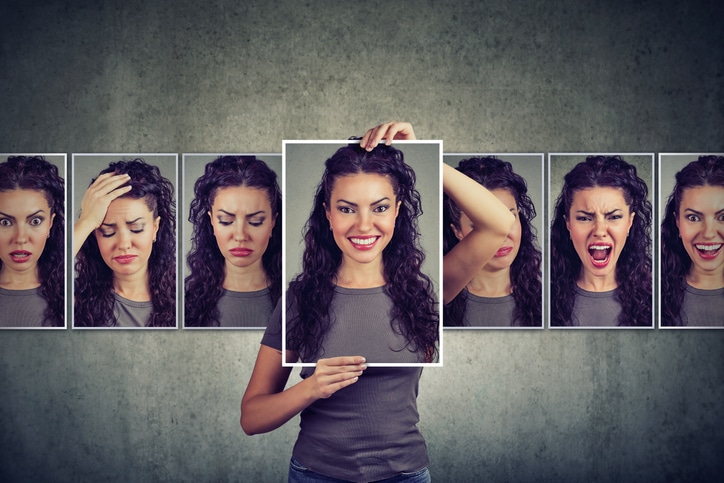
How Do I Know if I Have Bipolar Disorder?
Bipolar disorder may be one of the most misunderstood mental health disorders today. We’ve all heard of it, and if we’re being honest, we’ve all formed our own perceptions after seeing it portrayed in movies and on TV as individuals struggling with manic highs and dangerously dark lows. But the reality is more complex than that. For starters, there are multiple types of bipolar disorder, and it can be difficult for professionals to diagnose.
What Does Bipolar Mean?
Bipolar disorder affects over 5 million Americans (according to a study published in the Archives of General Psychiatry) and can often be misdiagnosed because of its overlapping list of symptoms with other illnesses. It’s usually diagnosed during the teen years or early twenties (and sometimes in kids) and usually requires some kind of lifelong treatment plan.
Bipolar disorder causes changes in mood and energy levels ranging from elation and hyperactivity to sadness and indifference. These are known as manic episodes and depressive episodes, respectively, while less severe manic episodes are called “hypomanic.”
… there are multiple types of bipolar disorder, and it can be difficult for professionals to diagnose.
Three Types of Bipolar Disorder
Bipolar I Disorder
Bipolar I is marked by manic episodes that last at least a week or severe manic symptoms requiring care at a hospital. This is usually followed by two weeks or more of depressive episodes, and it’s possible for someone to experience both simultaneously.
Bipolar II Disorder
Bipolar II includes a combination of less severe hypomanic and depressive episodes, with none of the full manic episodes found with Bipolar I.
Cyclothymia
Also known as Cyclothymic Disorder, this is when someone experiences both hypomanic and depressive symptoms for two or more years for adults (one year or more for children), but the symptoms don’t equate to full-on hypomanic or depressive episodes.
Signs of Bipolar Disorder
If you think a loved one may be bipolar, pay attention to the key signs of mania and depression.
7 Signs of Manic Episodes:
- Extreme restless feelings
- Feeling like you don’t need sleep
- Fast talking accompanied by racing thoughts
- Feeling incredibly happy or euphoric for long periods
- Easily distracted by surroundings
- Overconfidence in common abilities
- Impulsive behavior including sex, gambling, or spending sprees
7 Signs of Depressive Episodes:
- Fixation on death or thinking of/attempting suicide
- Severe exhaustion, fatigue, or lack of energy
- Withdrawal from loved ones and friends
- Sad feelings for long stretches of time
- Losing interest in hobbies or activities
- Memory and concentration problems
- Lack of eating or appetite
If someone you know is currently having a depressive episode or is at immediate risk of hurting themselves or someone else, call 911 or the local police ASAP. Stay with the person until police or paramedics arrive and remove any weapons and medications nearby, if possible. It’s important to listen to them calmly, without being threatening or argumentative. If they’re willing, put them on the phone so they can speak directly with a suicide prevention line.

Am I Bipolar?
Remember that only a medical doctor or mental health professional can diagnose you with Bipolar I, Bipolar II, or Cyclothymic Disorder — this means a licensed doctor, psychologist, psychiatrist, psychiatric nurse practitioner, or licensed professional counselor. If a spouse, partner, or friend labels you “bipolar,” that’s just an unqualified opinion and should be treated as such. If you’re experiencing any of the 14 signs of manic or depressive episodes, call your primary care doctor. He or she will know your medical history and be able to refer you to a mental health professional.
It’s important to remember that disorders of this nature are all about brain chemistry. If you’ve been diagnosed with bipolar disorder, it is not your fault. There are societal stigmas for every mental health disorder, and if it seems like people in your life are judging you, it’s likely because they’ve failed to really understand your disorder. Encourage them to do some research. With the right treatment and medication, you can live a fulfilling life in recovery.
If you’ve been diagnosed with bipolar disorder, it is not your fault.
Treatment for Bipolar Disorder
If you’re a young adult and a doctor or mental health provider diagnoses you as bipolar with a recommendation for treatment, The Meadows Outpatient Center can help. Our team is fully equipped to address bipolar disorder alongside any co-occurring substance use or mental health conditions in a safe environment that encourages healing. Give us a call today to find out more.

Reach Out Today
Convenient, comprehensive care is available. Your next chapter can start right now.